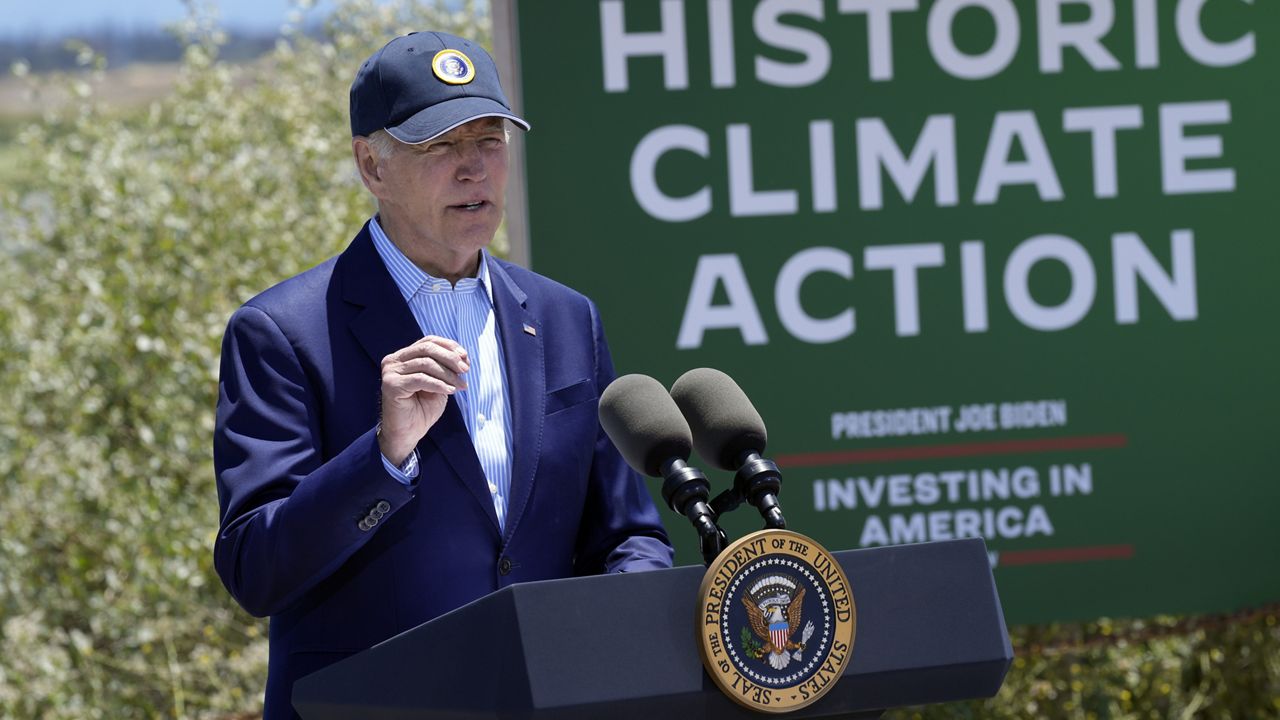President Joe Biden announced millions in funding to help communities adapt to extreme weather and touted his administration’s efforts to fight climate change, calling it “the existential threat to humanity,” while delivering remarks in Northern California on Monday.
The president was joined by California Gov. Gavin Newsom to unveil three new climate resilience efforts: $575 million in federal funding for the National Oceanic and Atmospheric Administration’s Climate Resilience Regional Challenge, money to modernize power grids and a White House summit focused on climate later this year.
The funds for the first-ever Climate Resilience Regional Challenge will come from the Inflation Reduction Act passed in August of last year and will be used to aid coastal and Great Lakes communities in building infrastructure and preparing for community-led relocation in response to sever weather and a changing climate.
“We’re investing in the people and places that have been hit the hardest but who are also on the front lines of leading us forward,” Biden said on Monday.
Karla Heidelberg, USC Dornsife Professor of the Practice of Biological Sciences and Environmental Studies and Director of the USC Sea Grant Program said climate change is creating issues like sea level rise and more intense and frequent storms, “and it’s really causing very large challenges in coastal areas, where most of the U.S. population is focused.”
She said she hopes this announcement spurs innovation and efforts to develop and implement “climate smart policies and regulations.”
“In the coastal communities, we’re thinking about and debating things like offshore wind energy solutions, we’re thinking more inland and also coastal, [about] initiatives in electric cars,” Heidelberg said. “Those are all driving innovation and they are driving innovation in a way that moves us away from fossil fuels.”
Biden also announced the Department of Energy is investing more than $2 billion to modernize the electric grid, with about $67 million of those funds starting off in California.
California was battered by a series of atmospheric rivers this winter, causing floods and power outages. Since the beginning of the year, Biden approved multiple disaster declarations for the state, which unlocks federal funding to respond.
Monday’s event took place at Lucy Evan Baylands Nature Interpretive Center and Preserve in Palo Alto, Calif., which White House press secretary Karine Jean-Pierre noted was once a landfill and “has become a leading example of the type of community-driven climate solutions that the federal government is investing in to harness nature to fight the climate crisis.”
“What we are seeing here is an amazing success story of how you can work together to make our communities more climate resilient,” Biden said on Monday.
Biden also unveiled a plan to bring together local, state, tribal and territorial leaders for a White House summit later this year, when the group will release a National Climate Resilience Framework. Heidelberg emphasized the importance of coordination between different levels of government.
“When you’re addressing something this large and this complex, there has to be federal leadership in order to be effective,” she said, adding “this provides a great start to that federal coordination.”
Biden also highlighted his efforts to combat climate change and create clean energy jobs, saying his administration is “taking the most aggressive climate action ever,” and coming down on some Republicans for “continuing to try to undo all the progress we’ve already made in the first two and a half years.”
“They were holding the country hostage over the debt limit unless I would gut the climate provisions in the Inflation Reduction Act,” Biden said.
Republicans argue Biden’s policies have stifled U.S. energy production and increased gas prices. The GOP-controlled House passed a sprawling energy package in March to increase domestic production of oil, natural gas and coal and ease permitting restrictions.
“Families are struggling because of President Biden’s war on American energy,” House Majority Leader Steve Scalise, R-La., said earlier this year.
Biden recently faced backlash from environmental activist groups for greenlighting the Willow project, a major oil drilling project on Alaska’s Beaufort Sea, as well as allowing the Mountain Valley Pipeline project to move forward as part of a deal he made with House Speaker Kevin McCarthy, R-Calif., to suspend the nation’s debt ceiling. The pipeline, which brings fuel from West Virginia to Virginia, has been a priority of moderate Democratic Senator Joe Manchin, D-W.Va.
Biden's trip to California includes multiple fundraisers in the San Francisco area as he ramps up his 2024 reelection campaign.



